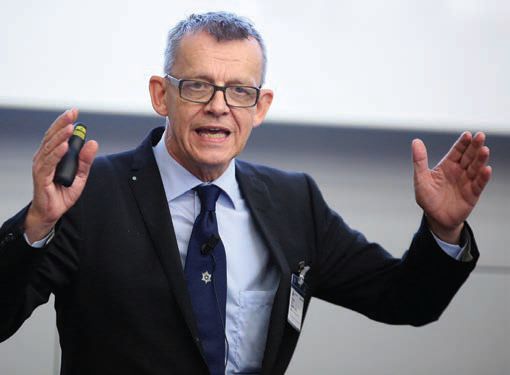Development: Some facts Hans Rosling taught us

I often wonder how to best show the impact of our combined efforts to eradicate poverty. Having worked on development issues for many years, I have seen the results first-hand. I have listened to women sharing how improved maternal care has enriched their family’s lives, and I have seen how access to financial services has turned unemployed youngsters into entrepreneurs who now employ others. While we all have examples of development co-operation that works, we sometimes lack the hard evidence, the facts, the data. When confronted with scepticism, our stories often become anecdotal examples with little value.
Solid data is essential to showing progress towards the UN Sustainable Development Goals (SDGs). We are in the midst of a data revolution where the combination of big data, open data and the rapid proliferation of information technology will radically boost our knowledge and understanding. But what will happen in the least developed and conflict-ridden countries where there are huge data gaps, or data of very poor quality?
While many members of the OECD’s Development Assistance Committee (DAC) provide support for the collection and processing of statistics in developing countries, there is more work to be done. DAC donor countries are only just tapping into the potential of big data for development co-operation.
To focus this year’s report on data for development is both timely and important. We must invest more in data. The global 2030 Agenda for Sustainable Development requires hard facts and figures to show what works and what doesn’t. We all need statistics to show successes and setbacks in development.
I also like to think that by putting the focus on data for development, we are paying tribute to Hans Rosling,* a legendary professor and statistician. Sadly, Hans passed away in 2017. No one has ever brought statistics to life in the way Hans did. No one has shown the importance of combining datasets to uncover new insights better than he did. I was fortunate enough to have had the opportunity to discuss development issues with Hans. He was straightforward. He asked questions like, “Why do you spend so much money on these human rights and democracy programmes when you have no data to show they’re working?” He argued that we should invest more in children’s and women’s health because he could show the data that proved these policies had the best return on investment. He was also very encouraging and constructive when Sweden embarked on its open data journey (though he thought we should have broken down costs in more detail).
One of Hans’ most poignant messages, which I believe to be both very true and yet very easy to forget, was, “ What you think you know may be wrong because the world is constantly changing. Check the data! ” We all tend to stick to what we know and seek information to confirm our beliefs. Data therefore serves as a reality check as numbers do not lie. We are two years into the implementation of the boldest and most far-reaching development agenda ever created. We will end extreme poverty and at the same time stop climate change and the degradation of biodiversity so that humans and nature can restore balance. To monitor this, we have agreed to follow progress on more than 200 indicators in every single country even though we still lack much of the data today.
We need to keep modernising and improving aid statistics and data on financing for sustainable development. We need to increase our support for statistical capacity where it is needed and make better use of results data for policy and feedback to citizens. From my experience, the hardest part will be getting more investment to boost statistical capacity in partner countries. Donors know this is important but NGOs are not pressuring governments to spend more on this; neither is this an effort ministers will get media attention for.
The challenge is great, but the opportunities and gains are even greater. With more and better data we can show the much needed progress that girls, boys, women and men are making around the world. With more and better data we can make better and more informed decisions on how to support families who strive for a decent life. With more and better data we can come closer to what Hans Rosling’s son, Ola, calls a world of “factfulness”: a world where opinions, however passionately held and articulated, are supported by facts.
*Hans Rosling was a Swedish physician, academic, statistician, and public speaker. He was Professor of International Health at Karolinska Institutet and co-founder and chairman of the Gapminder Foundation, which promotes the use of data to understand global development. Rosling passed away on 7 February 2017 at the age of 68.
Share article and links: http://oe.cd/27B
Development Co-operation Report 2017 https://doi.org/10.1787/dcr-2017-en
https://www.gapminder.org https://www.gapminder.org
